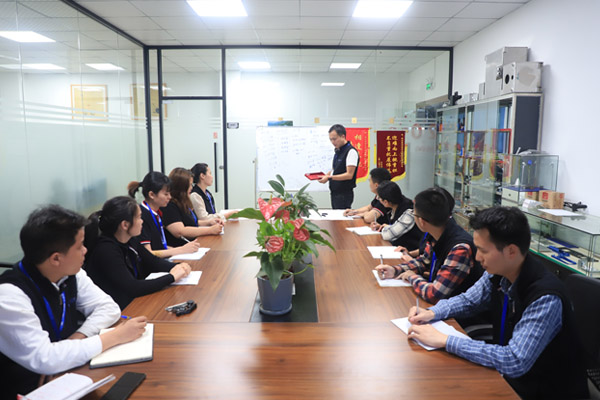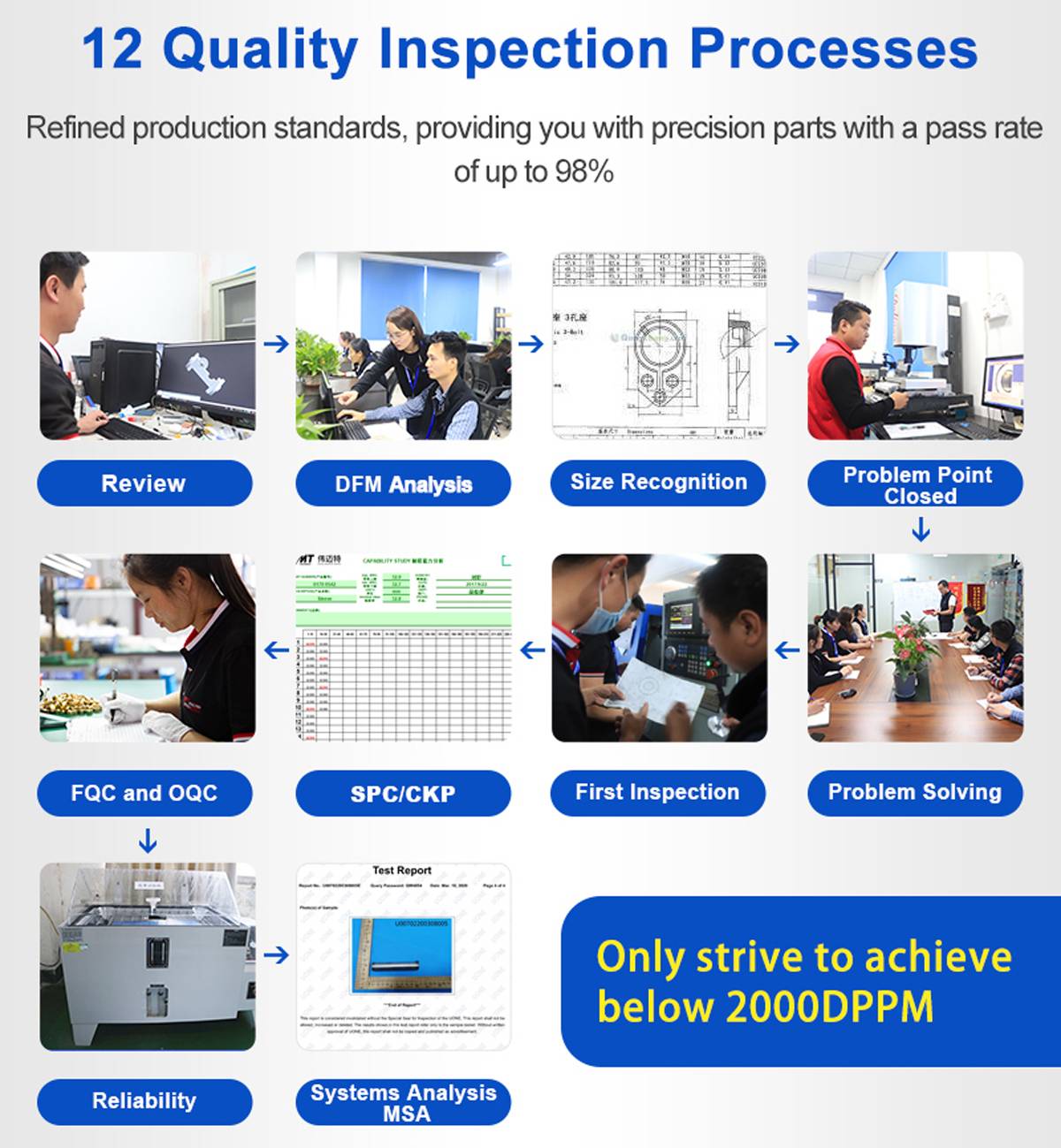15 years one-stop China custom CNC machining parts factory

Hey there I’m VMT Sam!
With 25 years of CNC machining experience we are committed to helping clients overcome 10000 complex part-processing challenges all to contribute to a better life through intelligent manufacturing. Contact us now
 109 |
Published by VMT at Mar 19 2024
109 |
Published by VMT at Mar 19 2024
Establishing an Effective CNC Machining Delivery Management System
In the realm of CNC machined parts manufacturing, delivery management stands as a pivotal metric for measuring factory operational efficiency and customer satisfaction. By instituting a robust delivery management system, CNC machining factories can not only enhance production efficiency and reduce resource wastage but also ensure the timely delivery of high-quality products, earning trust from customers and recognition in the market. This article delves into the discussion on how to establish an effective CNC machining delivery management system, focusing on aspects such as the production process of CNC machined parts, delivery management strategies, surface treatment technologies, and more.

I. Optimization of CNC Machined Parts Production Process
The production process of CNC machined parts forms the foundation for delivery management. Optimizing the production process involves increasing equipment utilization, minimizing non-value-added steps and waste, and shortening production cycles. Specific areas for improvement include:
Rational Planning of Production Line Layout:
Scientifically arrange the layout of production lines based on the machining characteristics of parts and equipment performance, ensuring smooth connections between different processes and reducing material handling time and distance.
Adoption of Advanced CNC Technologies and Automation:
Introduce high-precision and high-efficiency CNC machine tools and automation equipment to improve machining accuracy and efficiency, reducing manual intervention and errors.
Implementation of Lean Production Principles:
Continuously improve the production process to eliminate waste and enhance production efficiency. For example, adopt single-piece flow production to reduce work-in-progress inventory and accelerate the production pace.
II. Formulation and Implementation of Delivery Management Strategies
Developing and implementing effective delivery management strategies are crucial for ensuring on-time deliveries. Some specific strategies and recommendations include:
Establishment of a Comprehensive Order Management System:
Introduce advanced order management software to achieve real-time updates and sharing of order information, ensuring smooth communication between departments and improving response speed.
Detailed Production Planning and Delivery Schedules:
Based on order requirements and factory capacity, formulate practical production plans, clearly defining the start and end times of each process to ensure manageable production progress.
Enhanced Monitoring and Scheduling in Production Processes:
Monitor production progress and equipment status in real-time to identify and resolve issues during the production process promptly. Adjust production plans flexibly based on actual production conditions to adapt to market changes and customer demands.
Establishment of Effective Communication Mechanisms:
Strengthen communication and collaboration with customers, suppliers, and internal departments to ensure accurate information transmission and timely resolution of various issues and feedback, thereby improving customer satisfaction.

III. Selection and Application of Surface Treatment Technologies
Surface treatment technologies play a crucial role in enhancing the quality and performance of CNC machined parts. The selection of appropriate surface treatment technologies should consider their compatibility with the overall production process. Key considerations include:
Choice of Suitable Surface Treatment Technologies:
Depending on the environmental conditions and performance requirements of the parts, select appropriate surface treatment technologies. For instance, for parts requiring high wear resistance and corrosion resistance, technologies such as spraying and electroplating can be used to enhance surface hardness.

Ensuring Compatibility with the Overall Production Process:
When selecting surface treatment technologies, consider their compatibility with preceding and subsequent processes, ensuring the smooth execution of the entire production process.
Quality Control of Surface Treatment Technologies:
Implement strict process specifications and operating standards to ensure the stability and reliability of surface treatment technologies. Regularly perform quality inspections and assessments of surface treatment technologies to identify and resolve issues promptly.

IV. Continuous Improvement and Innovation Capability Development
Establishing an effective CNC machining delivery management system requires continuous improvement and innovation. Here are some suggestions:
Introduction of Advanced Management Concepts and Tools:
Learn and introduce advanced management concepts such as Six Sigma, Lean Production, and tools such as ERP and MES systems to enhance the scientific and systematic nature of delivery management.
Cultivation of Employee Innovation Awareness and Abilities:
Encourage employees to propose improvement ideas and suggestions, tapping into their innovative potential. Through training and exchanges, enhance employees' professional skills and overall qualities, providing talent support for the continuous improvement of the delivery management system.
Establishment of Incentive and Feedback Mechanisms:
Establish reward systems to commend and reward employees who make outstanding contributions to delivery management. Simultaneously, set up effective feedback mechanisms to promptly collect and address feedback from customers, employees, and the market, providing a basis for continuous improvement.
V. Conclusion and Outlook
Establishing an effective CNC machining delivery management system is a comprehensive undertaking that requires consideration of multiple factors, including optimizing production processes, formulating and implementing delivery management strategies, selecting and applying surface treatment technologies, and cultivating continuous improvement and innovation capabilities. Through continuous optimization and enhancement of the delivery management system, CNC machining factories can improve production efficiency, reduce costs, enhance quality, and stand out in the competitive market.
Looking ahead, with the continual advancement of technology and evolving market demands, CNC machining delivery management systems will face more challenges and opportunities. Therefore, CNC machining factories need to maintain keen market insights and innovation capabilities, continuously explore new management concepts and technological means, and collaborate with other fields to collectively drive the sustained development and progress of the CNC machined parts manufacturing industry.
In summary, establishing an effective CNC machining delivery management system is a vital pathway to enhance factory operational efficiency and customer satisfaction. Through optimizing production processes, implementing delivery management strategies, selecting suitable surface treatment technologies, and fostering continuous improvement and innovation capabilities, CNC machining factories can establish a resilient position in the competitive market.
Ready To Start Your Next Project?
Get Instant Quote

Request a Free Quote
Send us a message if you have any questions or request a quote. We will get back to you ASAP!